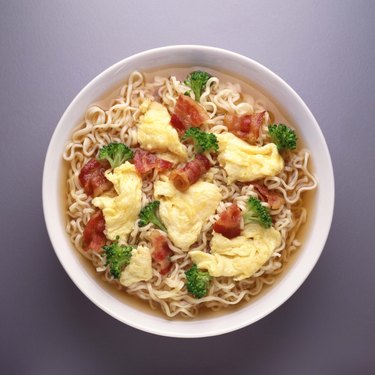
Ramen noodles don't have a reputation for causing diarrhea, but they do contain ingredients that could trigger digestive distress in people with allergies and sensitivities. The noodles contain gluten, wheat and soybeans, while the flavor packet may have milk and monosodium glutamate in its ingredients. Talk to your doctor if diarrhea lasts more than two days, you have a severe pain in the abdomen or rectum, or you develop a fever.
Reaction to Gluten
Video of the Day
Ramen noodles are made from wheat flour, which contains a group of proteins collectively called gluten. In celiac disease, gluten triggers an immune response, which attacks the small intestine. In addition to causing inflammation, structures that absorb nutrients undergo harm. People with gluten sensitivity have gastrointestinal reactions, but the intestine isn't damaged. Diarrhea and abdominal pain are common symptoms associated with both conditions.
Video of the Day
Anyone with celiac disease should avoid ramen noodles because of their gluten. If you have a gluten sensitivity, be cautious and eat only the amount you can tolerate.
Allergy-Causing Ingredients
If you have diarrhea after eating ramen noodles, it may be due to an allergy or sensitivity to one of the other ingredients. In addition to wheat, most ramen noodles contain soy, some have milk and others include shellfish in their ingredients. Wheat, soy, milk and shellfish are four of the top eight foods responsible for 90 percent of all food allergies, reports Food Allergy Research and Education.
Check the label carefully, because some makers report that the noodles are products of a facility that also processes eggs, peanuts, tree nuts and fish. As a result, they may contain traces of those ingredients, which are the remaining allergens in the top eight.
Fat Content
The two primary ingredients in ramen noodles are wheat flour and vegetable oil. After the flour and oil are mixed and kneaded, the noodles are stretched into long strands and formed into a square or round shape. More fat comes from cooking in oil before drying.
The final product has 7 grams of fat per serving, or 11 percent of the daily value based on a 2,000-calorie-a-day diet. Fatty foods can cause diarrhea or make existing diarrhea worse, reports the University of Michigan. High-fat foods may trigger diarrhea in people with gastrointestinal disorders such as irritable bowel syndrome.
Flavor Packet Concerns
If you're lactose intolerant and the ramen noodles you buy contain milk, they may -- or may not -- trigger diarrhea, depending on the severity of your intolerance and the amount of milk in the brand you buy. Since the milk is often in the flavor packet, you can avoid the problem by replacing the packet with plain broth.
The flavor packet may also contain monosodium glutamate, or MSG. People sensitive to MSG usually don't experience diarrhea. They report symptoms such as headaches, numbness or tingling, flushing and drowsiness. But MSG may stimulate the small intestine and cause explosive diarrhea, according to Dr. Russell Blaylock, quoted by the Arizona Center for Advanced Medicine.
- National Institute of Diabetes and Digestive and Kidney Diseases: Diarrhea
- University of Florida IFAS Extension: Being Smart About Gluten and Gluten-Free Issues, Part 1: What are the Health Concerns Surrounding Gluten?
- Food Allergy Research and Education: Allergens
- University of Michigan: Nutritional Management of Diarrhea
- Jackson Siegelbaum Gastroenterology
- National Institute of Diabetes and Digestive and Kidney Diseases: Eating, Diet and Nutrition for Irritable Bowel Syndrome
- U.S. Food and Drug Administration: Questions and Answers on Monosodium Glutamate (MSG)
- Arizona Center for Advanced Medicine: MSG -- Monosodium Glutamate